28 july 2014

Tel Aviv University joins the offensive on Gaza: polices students Facebook accounts and encourages physiotherapy students to offer massages to soldiers in a naval base in Ashkelon
Academic institutions in Israel have enthusiastically and voluntarily joined Israel's campaign of massacres and destruction in the Gaza Strip.
From disciplining students and staff who express "offensive" opinions, establishing hasbara teams and offering tuition assistance to soldiers: Israel's academia on the front lines.
In a circular sent to all staff and students, the administration of Tel Aviv University wrote that "Tel Aviv University embraces and supports all security forces acting to restore the quiet and security to Israel, including its students and workers who were called for reserve duty". The official letter continues: "The university denounces and condemns all offensive and extreme remarks propagated these days on social networks which have no place in the public discourse. The university will operate in accordance with disciplinary regulations applicable to students and faculty in all cases of infringement."
In response to a question by the Israeli economic news outlet TheMarker, the university administration stated that the purpose of the letter is to "prevent expressions of extreme hatred by the radical left and radical right". It is the university, apparently, which will both police private statements by students and teachers, and rule on their 'extremity'.
In countering the Palestinian demand for a boycott of Israeli academic institutions, administrations often righteously explain the importance of freedom of expression and dialogue, values they inherently promote, suggest that many of their staff members are working for peace and that the campuses themselves are living examples of coexistence between Israelis and Arabs.
Tel Aviv University may well present this "patriotic act" in its fundraising efforts from abroad. Indeed, the university has promised tuition assistance to students currently in Gaza, help that will come from the various 'friends of Tel Aviv University' chapters throughout the world. The university further gathered "equipment, food and supplies" for soldiers.
Tel Aviv University is not alone on the academic frontline against Gaza. President of the Interdisciplinary Center (IDC) Herzliya wrote to the 'IDC family' that "These are difficult days. Our students and alumni are fighting in the Gaza Strip. This campaign is a justified war of defense. This is the time to support our fighters, to assist in any way possible from the home front".
President Uriel Reichman continues, noting that "Already two weeks ago, the Student Union began operating an Operations Room for online public diplomacy. The spirit of volunteerism and the fact that 1,500 students from abroad, from more than 80 countries, study at IDC have enabled the operation of the most important public diplomacy center in Israel. The struggle for international awareness and Israel’s legitimization is managed on campus by 560 volunteers working in shifts around the clock."
IDC is not alone in its hasbara efforts. The College of Management also established a public diplomacy "war room". A student-initiated project, TheMarker reports that "the room is in contact with the Foreign Office to produce uniform information".
Hebrew University's administration and student union collected "food and equipment" for soldiers, and some 200 boxes of goods were sent to the Gaza border last week. Bar Ilan university held a prayer meeting last week. Haifa University, a large percentage of whose students are Palestinian citizens of Israel, began illuminating its central tower at night in the form of the Israeli flag. In this spirit, students at the Physiotherapy Academic College will travel to the naval base in the southern city of Ashkelon navy base and offer massages to soldiers.
Academic institutions in Israel have enthusiastically and voluntarily joined Israel's campaign of massacres and destruction in the Gaza Strip.
From disciplining students and staff who express "offensive" opinions, establishing hasbara teams and offering tuition assistance to soldiers: Israel's academia on the front lines.
In a circular sent to all staff and students, the administration of Tel Aviv University wrote that "Tel Aviv University embraces and supports all security forces acting to restore the quiet and security to Israel, including its students and workers who were called for reserve duty". The official letter continues: "The university denounces and condemns all offensive and extreme remarks propagated these days on social networks which have no place in the public discourse. The university will operate in accordance with disciplinary regulations applicable to students and faculty in all cases of infringement."
In response to a question by the Israeli economic news outlet TheMarker, the university administration stated that the purpose of the letter is to "prevent expressions of extreme hatred by the radical left and radical right". It is the university, apparently, which will both police private statements by students and teachers, and rule on their 'extremity'.
In countering the Palestinian demand for a boycott of Israeli academic institutions, administrations often righteously explain the importance of freedom of expression and dialogue, values they inherently promote, suggest that many of their staff members are working for peace and that the campuses themselves are living examples of coexistence between Israelis and Arabs.
Tel Aviv University may well present this "patriotic act" in its fundraising efforts from abroad. Indeed, the university has promised tuition assistance to students currently in Gaza, help that will come from the various 'friends of Tel Aviv University' chapters throughout the world. The university further gathered "equipment, food and supplies" for soldiers.
Tel Aviv University is not alone on the academic frontline against Gaza. President of the Interdisciplinary Center (IDC) Herzliya wrote to the 'IDC family' that "These are difficult days. Our students and alumni are fighting in the Gaza Strip. This campaign is a justified war of defense. This is the time to support our fighters, to assist in any way possible from the home front".
President Uriel Reichman continues, noting that "Already two weeks ago, the Student Union began operating an Operations Room for online public diplomacy. The spirit of volunteerism and the fact that 1,500 students from abroad, from more than 80 countries, study at IDC have enabled the operation of the most important public diplomacy center in Israel. The struggle for international awareness and Israel’s legitimization is managed on campus by 560 volunteers working in shifts around the clock."
IDC is not alone in its hasbara efforts. The College of Management also established a public diplomacy "war room". A student-initiated project, TheMarker reports that "the room is in contact with the Foreign Office to produce uniform information".
Hebrew University's administration and student union collected "food and equipment" for soldiers, and some 200 boxes of goods were sent to the Gaza border last week. Bar Ilan university held a prayer meeting last week. Haifa University, a large percentage of whose students are Palestinian citizens of Israel, began illuminating its central tower at night in the form of the Israeli flag. In this spirit, students at the Physiotherapy Academic College will travel to the naval base in the southern city of Ashkelon navy base and offer massages to soldiers.
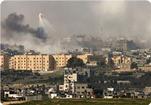
Head of the Palestinian Water Authority Shaddad Attili confirmed that 70 per cent of the water installations in Gaza Strip are malfunctioning as a result of being targeted in the Israeli army attacks or due to power and fuel shortage. This led to a decrease of 70-80 per cent in comparison to the original quantities, in addition to the deteriorating water, health, and environmental situation.
In a press statement, Attili warned of the serious risks faced by the people of Gaza Strip as one of the most populated places on earth due to the continued blockade and water pollution and the lack of power to run vital installations.
He pointed out that the water authority crews have not been able till now to evaluate the damage caused by the Israeli war on Gaza Strip due to the continued hostilities against the civilians and infrastructure .The preliminary estimates for the necessary repairs in the water sector reached nearly five million dollars.
He added that among nearly one million people out of 1.8 million citizens are deprived of drinking water as a result of the sewer lines damage and the accumulation of waste.
He reported that more than 110 thousand people who sought refuge in UNRWA schools, public schools, other families' homes and public squares are facing water shortage due to the frequent targeting of water lines or the inability of the water cisterns to meet the people's needs.
Attili warned of the imminent danger resulted of the flow of wastewater in many areas especially in north Gaza (Beit Hanoun, Beit Lahia) after the targeting of sewer lines and sanitary pumps, in addition to power shortage and sewer flooding that may lead to the spread of diseases and epidemics.
He pointed out that five members of the technical teams were killed after being targeted while working to repair the damages, saying that they cannot reach some areas especially the civilian communities on the northern borders of Gaza (almost 600 thousand people).
Attili emphasized that war crimes were committed in Gaza Strip including the significant targeting of the Strip’s infrastructure, water supply and sanitation.
It resulted in the destruction of water utilities such as water wells, water pipes and networks and the mixing of sewage and potable water.
He explained that the preliminary assessment of the relief needs for water works and sewage reached more than five million dollars and approximately twenty million dollars to repair the sanitation infrastructure damage.
He called on water sector’s donor countries and international organizations to support the efforts of the “Water Authority”, international organizations and the Red Cross to meet water and sanitation humanitarian needs and to provide support for the provision of drinking water for the displaced people and for the entire population in the Gaza Strip in general.
He stressed the need to work immediately to provide safe corridors, to stop targeting technical crews and fuel and water tanks, and to enable Water Authority and municipal crews to restore the artesian wells and desalination plants that have been directly or indirectly targeted.
In a press statement, Attili warned of the serious risks faced by the people of Gaza Strip as one of the most populated places on earth due to the continued blockade and water pollution and the lack of power to run vital installations.
He pointed out that the water authority crews have not been able till now to evaluate the damage caused by the Israeli war on Gaza Strip due to the continued hostilities against the civilians and infrastructure .The preliminary estimates for the necessary repairs in the water sector reached nearly five million dollars.
He added that among nearly one million people out of 1.8 million citizens are deprived of drinking water as a result of the sewer lines damage and the accumulation of waste.
He reported that more than 110 thousand people who sought refuge in UNRWA schools, public schools, other families' homes and public squares are facing water shortage due to the frequent targeting of water lines or the inability of the water cisterns to meet the people's needs.
Attili warned of the imminent danger resulted of the flow of wastewater in many areas especially in north Gaza (Beit Hanoun, Beit Lahia) after the targeting of sewer lines and sanitary pumps, in addition to power shortage and sewer flooding that may lead to the spread of diseases and epidemics.
He pointed out that five members of the technical teams were killed after being targeted while working to repair the damages, saying that they cannot reach some areas especially the civilian communities on the northern borders of Gaza (almost 600 thousand people).
Attili emphasized that war crimes were committed in Gaza Strip including the significant targeting of the Strip’s infrastructure, water supply and sanitation.
It resulted in the destruction of water utilities such as water wells, water pipes and networks and the mixing of sewage and potable water.
He explained that the preliminary assessment of the relief needs for water works and sewage reached more than five million dollars and approximately twenty million dollars to repair the sanitation infrastructure damage.
He called on water sector’s donor countries and international organizations to support the efforts of the “Water Authority”, international organizations and the Red Cross to meet water and sanitation humanitarian needs and to provide support for the provision of drinking water for the displaced people and for the entire population in the Gaza Strip in general.
He stressed the need to work immediately to provide safe corridors, to stop targeting technical crews and fuel and water tanks, and to enable Water Authority and municipal crews to restore the artesian wells and desalination plants that have been directly or indirectly targeted.

The Euro-Mid Observer for Human Rights has called on western countries to withdraw their citizens who serve as mercenaries in the Israeli army. Euro-Mid Observer revealed on Sunday that hundreds of Europeans, Americans, and Canadians, who have enrolled in the Israeli army, had taken part in killing Palestinian civilians especially in Gaza.
The human rights observer pointed to the Israeli programs and campaigns that work on recruiting Jews from foreign countries in the Israeli army.
Around 6,000 foreign mercenaries including 2,000 Americans are currently fighting within the Israeli army, the report said.
The U.S. State Department announced last week that two American soldiers were killed during clashes in Gaza, identified as Max Steinberg, 24, and Nassim Sean Carmeli, 21, who were fighting within the Golani Brigade.
Euro-Mid Observer documented that a number of non-Israeli soldiers were also killed during the ongoing aggression on Gaza.
The report said that dozens of non-Israeli soldiers took part in the two previous Israeli aggressions on Gaza in 2008/2009 and 2012.
“In light of the horrific crimes committed by the Israeli army in Gaza, we call on western countries to withdraw their citizens and to prevent them being engaged in future crimes”, the Geneva-based Observer said in its statement.
Euro-Mid Observer expressed its fears that these non-Israeli soldiers might receive financial motivation to serve in the Israeli army, which make them mercenaries according to Article 47 of Additional Protocol I to the Geneva Conventions, 8 June 1977.
The human rights observer pointed to the Israeli programs and campaigns that work on recruiting Jews from foreign countries in the Israeli army.
Around 6,000 foreign mercenaries including 2,000 Americans are currently fighting within the Israeli army, the report said.
The U.S. State Department announced last week that two American soldiers were killed during clashes in Gaza, identified as Max Steinberg, 24, and Nassim Sean Carmeli, 21, who were fighting within the Golani Brigade.
Euro-Mid Observer documented that a number of non-Israeli soldiers were also killed during the ongoing aggression on Gaza.
The report said that dozens of non-Israeli soldiers took part in the two previous Israeli aggressions on Gaza in 2008/2009 and 2012.
“In light of the horrific crimes committed by the Israeli army in Gaza, we call on western countries to withdraw their citizens and to prevent them being engaged in future crimes”, the Geneva-based Observer said in its statement.
Euro-Mid Observer expressed its fears that these non-Israeli soldiers might receive financial motivation to serve in the Israeli army, which make them mercenaries according to Article 47 of Additional Protocol I to the Geneva Conventions, 8 June 1977.
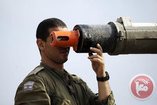
Israel must be ready for a "lengthy" military campaign in the Gaza Strip, Prime Minister Benjamin Netanyahu said on Monday.
"We must be prepared for a lengthy campaign" in Gaza, he said in a speech televised shortly after at least four people were killed in southern Israel by a mortar fired by militants in Gaza.
"Israeli citizens cannot live with the threat from rockets and from death tunnels -- death from above and from below," he said.
"We will not end this operation without neutralizing the tunnels whose sole purpose is killing our citizens."
Netanyahu also said that the international community must demand the "demilitarization of Gaza."
"We must be prepared for a lengthy campaign" in Gaza, he said in a speech televised shortly after at least four people were killed in southern Israel by a mortar fired by militants in Gaza.
"Israeli citizens cannot live with the threat from rockets and from death tunnels -- death from above and from below," he said.
"We will not end this operation without neutralizing the tunnels whose sole purpose is killing our citizens."
Netanyahu also said that the international community must demand the "demilitarization of Gaza."
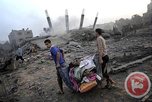
The Israeli military on Monday evening sent text messages and phone calls to residents of all cities in the northern Gaza Strip and parts of Gaza City telling them to evacuate their homes "immediately," potentially displacing more than 400,000 people.
The military said in a statement that it had told the residents of Shujaiyya and Zaitoun neighborhoods in northern and eastern Gaza City as well Jabaliya, Beit Hanoun, and Beit Lahiya cities in northern Gaza to evacuate their homes and leave for central Gaza City.
The Israeli military has previously said that it would treat all civilians who stay behind in areas it had deemed off-limits to be combatants.
The warnings come after an Israeli drone strike killed 10 people in a playground in al-Shati, after Gaza militants fired rockets into Israel earlier in the day in response to Israeli shelling.
Israeli shelling and airstrikes on Monday killed 22 and injured more than 100, while medical crews found 12 more bodies in the rubble, bringing the total number dead since the beginning of hostilities 21 days ago to at least 1,067.
Four Israeli civilians were killed in a mortar shell on the city of Eshkol near the border, in the deadliest incident for Israeli civilians since the beginning of hostilities 10 days ago. The deaths bring the total to six, as well as one foreign workers killed in a rocket attack.
The UN's Palestine refugee agency UNRWA said early last week that 43 percent of the Gaza Strip had been deemed off-limits to civilians.
The Israeli assault has already displaced 135,000 people in the last 21 days, as more than 2,000 homes have been destroyed and the Israeli army has told tens of thousands of flee their homes.
All borders in and out of the Gaza Strip are shut to civilians, however, and UN-designated shelters have been bombed repeatedly in Israeli airstrikes and shelling.
Operation Protective Edge was launched 21 days ago in what Israel said was an attempt to stop rocket fire from the Gaza Strip, which had increased after Israel launched a massive operation in the West Bank that left 10 Palestinians dead, 130 injured, and more than 600 Hamas-affiliated individuals in prison.
The operation, named "Brother's Keeper," was launched in order to find three Israeli teenagers who disappeared in June from the Jewish settlement of Gush Etzion in the West Bank.
Israel blamed Hamas for the kidnapping without any evidence, a charge the group denied.
Hamas has said since the assault began that it would only accept a ceasefire on the condition that Israel ends its eight-year blockade of the Gaza Strip, which has led to recurring shortages of basic necessities as well as electricity, fuel, and water.
Israel, however, has refused to accept this condition, saying it would keep the assault going until it undermined Hamas' military capabilities, particularly its tunnels system.
The military said in a statement that it had told the residents of Shujaiyya and Zaitoun neighborhoods in northern and eastern Gaza City as well Jabaliya, Beit Hanoun, and Beit Lahiya cities in northern Gaza to evacuate their homes and leave for central Gaza City.
The Israeli military has previously said that it would treat all civilians who stay behind in areas it had deemed off-limits to be combatants.
The warnings come after an Israeli drone strike killed 10 people in a playground in al-Shati, after Gaza militants fired rockets into Israel earlier in the day in response to Israeli shelling.
Israeli shelling and airstrikes on Monday killed 22 and injured more than 100, while medical crews found 12 more bodies in the rubble, bringing the total number dead since the beginning of hostilities 21 days ago to at least 1,067.
Four Israeli civilians were killed in a mortar shell on the city of Eshkol near the border, in the deadliest incident for Israeli civilians since the beginning of hostilities 10 days ago. The deaths bring the total to six, as well as one foreign workers killed in a rocket attack.
The UN's Palestine refugee agency UNRWA said early last week that 43 percent of the Gaza Strip had been deemed off-limits to civilians.
The Israeli assault has already displaced 135,000 people in the last 21 days, as more than 2,000 homes have been destroyed and the Israeli army has told tens of thousands of flee their homes.
All borders in and out of the Gaza Strip are shut to civilians, however, and UN-designated shelters have been bombed repeatedly in Israeli airstrikes and shelling.
Operation Protective Edge was launched 21 days ago in what Israel said was an attempt to stop rocket fire from the Gaza Strip, which had increased after Israel launched a massive operation in the West Bank that left 10 Palestinians dead, 130 injured, and more than 600 Hamas-affiliated individuals in prison.
The operation, named "Brother's Keeper," was launched in order to find three Israeli teenagers who disappeared in June from the Jewish settlement of Gush Etzion in the West Bank.
Israel blamed Hamas for the kidnapping without any evidence, a charge the group denied.
Hamas has said since the assault began that it would only accept a ceasefire on the condition that Israel ends its eight-year blockade of the Gaza Strip, which has led to recurring shortages of basic necessities as well as electricity, fuel, and water.
Israel, however, has refused to accept this condition, saying it would keep the assault going until it undermined Hamas' military capabilities, particularly its tunnels system.
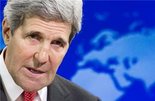
US Secretary of State John Kerry Monday said international efforts to agree a truce between Israel and the Palestinians in Gaza must lead to the disarmament of Hamas.
Kerry, who arrived back in Washington late Sunday after a week-long mission in the Middle East to try to stop the fighting, told reporters he was continuing to work "toward establishing an unconditional humanitarian ceasefire."
Such a truce "could honor Eid which begins now and that will stop the fighting, allow desperately needed food and medicine and other supplies into Gaza and enable Israel to address the threat which we fully understand and which is real, the threat posed by tunnel attacks."
"We believe the momentum generated by a humanitarian ceasefire is the best way to be able to begin to negotiate and find out if you can put in place a sustainable ceasefire on that addresses all of the concerns," the top US diplomat insisted.
But he added: "We also believe that any process to resolve the crisis in Gaza in a lasting and meaningful way must lead to the disarmament of Hamas and all terrorist groups."
"Regrettably, there were misunderstandings about 12 hours versus 24 hours" which blighted his efforts last week to extend a short 12-hour ceasefire, Kerry said.
"So we are trying to work hard to see if these issues can be clarified in a way that allows Israel and the Palestinian Authority and factions, the other countries involved, working through the Egyptian initiative, to be able to find a way to silence the weapons long enough to be able to begin to negotiate."
The conflict now in its third week has killed more than 1,000 Palestinians.
The Israeli army on Monday sent messages to thousands of Palestinians living near Gaza City to flee, after a mortar shell killed at least four people in Israel.
Kerry, who arrived back in Washington late Sunday after a week-long mission in the Middle East to try to stop the fighting, told reporters he was continuing to work "toward establishing an unconditional humanitarian ceasefire."
Such a truce "could honor Eid which begins now and that will stop the fighting, allow desperately needed food and medicine and other supplies into Gaza and enable Israel to address the threat which we fully understand and which is real, the threat posed by tunnel attacks."
"We believe the momentum generated by a humanitarian ceasefire is the best way to be able to begin to negotiate and find out if you can put in place a sustainable ceasefire on that addresses all of the concerns," the top US diplomat insisted.
But he added: "We also believe that any process to resolve the crisis in Gaza in a lasting and meaningful way must lead to the disarmament of Hamas and all terrorist groups."
"Regrettably, there were misunderstandings about 12 hours versus 24 hours" which blighted his efforts last week to extend a short 12-hour ceasefire, Kerry said.
"So we are trying to work hard to see if these issues can be clarified in a way that allows Israel and the Palestinian Authority and factions, the other countries involved, working through the Egyptian initiative, to be able to find a way to silence the weapons long enough to be able to begin to negotiate."
The conflict now in its third week has killed more than 1,000 Palestinians.
The Israeli army on Monday sent messages to thousands of Palestinians living near Gaza City to flee, after a mortar shell killed at least four people in Israel.

Palestinian militant groups launched dozens of rockets into Israel on Monday evening, after a relative lull in the Israeli assault that began late Sunday ended with the killing of at least 10 Palestinians in the afternoon.
Hamas spokesman Sami Abu Zuhri said that the strike at al-Shati refugee camp which left eight children dead were a "war crime that provoked the feelings of Muslims on the day of Eid," adding that they were "a result of the silence of the international community."
"It will not break our will," he continued, adding: "The occupation will pay the price."
Islamic Jihad, meanwhile, said that the killing of children by Israel was a "methodical policy of aggression" and that the group would respond with force.
Rocket fire on Monday by Palestinian militant groups killed four Israelis and injured at least four more, in the deadliest day for Israeli civilians since the hostilities began 21 days ago.
Militant groups claimed a number of rocket launches, although the majority targeted military sites in or near the Gaza Strip.
The Hamas-affiliated Al-Qassam Brigades claimed responsibility for targeting Israeli military forces east of Beit Hanoun with five 120 mortars, east of Jabaliya with six mortar shells, east of Khuzaa with five 120 mortars, east of Maghazi with eight mortars, east of Juhr al-Dik with five 107 rockets, and the Hashudat military side northeast of Beit Lahiya with four shells.
The Al-Quds Brigades, the military wing of the Islamic Jihad Movement in Palestine, claimed responsibility for the bombing of Beeri kibbutz in Eshkol in southern Israel with 107 rockets, the bombing of Israeli military vehicles east of Jabaliya with six mortar shells, the targeting of Yad Mordechai inside Israel with five 107 rockets, and the targeting of Nahal Oz, also inside Israel, with four 107 missiles.
The group also said it hit Nahal Oz three mortars and struck Ashkelon with a Grad missile.
Sirens arning of incoming rockets were also heard in Haifa, although no group had yet claimed responsibility for the attacks.
Palestinian militant groups say that the rocket fire is in response to the longstanding Israeli occupation and the eight-year old blockade of the Gaza Strip by Israel.
The rocket fire rarely causes damages or injuries inside Israel, although previously three have been killed and about a dozen injured since the beginning of hostilities.
Israel has killed more than 1,050 Palestinians, the majority civilians, since Operation Protective Edge began.
Hamas spokesman Sami Abu Zuhri said that the strike at al-Shati refugee camp which left eight children dead were a "war crime that provoked the feelings of Muslims on the day of Eid," adding that they were "a result of the silence of the international community."
"It will not break our will," he continued, adding: "The occupation will pay the price."
Islamic Jihad, meanwhile, said that the killing of children by Israel was a "methodical policy of aggression" and that the group would respond with force.
Rocket fire on Monday by Palestinian militant groups killed four Israelis and injured at least four more, in the deadliest day for Israeli civilians since the hostilities began 21 days ago.
Militant groups claimed a number of rocket launches, although the majority targeted military sites in or near the Gaza Strip.
The Hamas-affiliated Al-Qassam Brigades claimed responsibility for targeting Israeli military forces east of Beit Hanoun with five 120 mortars, east of Jabaliya with six mortar shells, east of Khuzaa with five 120 mortars, east of Maghazi with eight mortars, east of Juhr al-Dik with five 107 rockets, and the Hashudat military side northeast of Beit Lahiya with four shells.
The Al-Quds Brigades, the military wing of the Islamic Jihad Movement in Palestine, claimed responsibility for the bombing of Beeri kibbutz in Eshkol in southern Israel with 107 rockets, the bombing of Israeli military vehicles east of Jabaliya with six mortar shells, the targeting of Yad Mordechai inside Israel with five 107 rockets, and the targeting of Nahal Oz, also inside Israel, with four 107 missiles.
The group also said it hit Nahal Oz three mortars and struck Ashkelon with a Grad missile.
Sirens arning of incoming rockets were also heard in Haifa, although no group had yet claimed responsibility for the attacks.
Palestinian militant groups say that the rocket fire is in response to the longstanding Israeli occupation and the eight-year old blockade of the Gaza Strip by Israel.
The rocket fire rarely causes damages or injuries inside Israel, although previously three have been killed and about a dozen injured since the beginning of hostilities.
Israel has killed more than 1,050 Palestinians, the majority civilians, since Operation Protective Edge began.

The Israeli military said in a statement Monday that five soldiers had been killed, bringing the total since the outbreak of hostilities to 48.
Qassam Brigades says 10 Israeli soldiers killed in tunnel raid
The Hamas-affiliated al-Qassam Brigades on Monday said the group's fighters had killed 10 Israeli soldiers in an operation inside Israel east of al-Shujaiyya.
Al-Qassam said in a statement that its fighters infiltrated "behind enemy lines" and killed 10 soldiers.
All of its fighters had returned safely to base, the group added.
The Israeli army said in a statement that they had prevented an "attempted infiltration from the northern Gaza Strip through an offensive tunnel into Israel."
The statement added that "militants opened fire" at Israeli forces and "searches were being carried out to find them."
Israeli channel 10 said that an "exchange of fire" had occurred near Nahal Oz east of Gaza, and quoted the Israeli army as saying that they had killed four fighters.
Palestinian militants have killed 43 Israeli soldiers since the beginning of the Israeli assault on Gaza three weeks ago.
Qassam Brigades says 10 Israeli soldiers killed in tunnel raid
The Hamas-affiliated al-Qassam Brigades on Monday said the group's fighters had killed 10 Israeli soldiers in an operation inside Israel east of al-Shujaiyya.
Al-Qassam said in a statement that its fighters infiltrated "behind enemy lines" and killed 10 soldiers.
All of its fighters had returned safely to base, the group added.
The Israeli army said in a statement that they had prevented an "attempted infiltration from the northern Gaza Strip through an offensive tunnel into Israel."
The statement added that "militants opened fire" at Israeli forces and "searches were being carried out to find them."
Israeli channel 10 said that an "exchange of fire" had occurred near Nahal Oz east of Gaza, and quoted the Israeli army as saying that they had killed four fighters.
Palestinian militants have killed 43 Israeli soldiers since the beginning of the Israeli assault on Gaza three weeks ago.
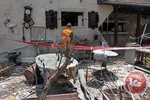
An Israeli soldier inspects the damage at an house that was hit by a rocket fired by militants from the Gaza Strip, on July 22, 2014, in the Israeli town of Yahud
Israeli media reports on Monday said that a number of Israelis were killed and nearly a dozen critically wounded in a mortar strike on Eshkol in southern Israel.
Israeli news site Haaretz said that four were killed, while other sites gave a figure of six.
Israeli news site Ynet said that ten were critically injured in the attack, which hit an Israeli town near the Gaza border.
A Ma'an reporter, however, quoted Israeli television as saying two of the injured had succumbed to their wounds.
Three people in Israel have previously been killed by rocket fire from the Gaza Strip, while Palestinian militants have killed 43 soldiers during the ground assault on Gaza.
More than 1,050 Palestinians -- the vast majority civilians -- have been killed during the 21-day Israeli assault on Gaza.
Israeli media reports on Monday said that a number of Israelis were killed and nearly a dozen critically wounded in a mortar strike on Eshkol in southern Israel.
Israeli news site Haaretz said that four were killed, while other sites gave a figure of six.
Israeli news site Ynet said that ten were critically injured in the attack, which hit an Israeli town near the Gaza border.
A Ma'an reporter, however, quoted Israeli television as saying two of the injured had succumbed to their wounds.
Three people in Israel have previously been killed by rocket fire from the Gaza Strip, while Palestinian militants have killed 43 soldiers during the ground assault on Gaza.
More than 1,050 Palestinians -- the vast majority civilians -- have been killed during the 21-day Israeli assault on Gaza.
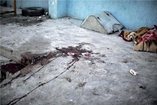
Israeli army confirms Thursday's shelling of UN refuge
Palestinian Muslims in Gaza say they had hoped to have a quiet holiday of Eid al-Fitr, which begins Monday and goes until Friday. But, the Israeli military began pounding Gaza with bombs as soon as the ‘temporary ceasefire’ was scheduled to end – at noon on Monday. Two of the targets were a playground and a hospital.
The strike on a park -- suspected to be a drone strike -- hit a playground beside al-Shati refugee camp, near the beach in Gaza City, killing 10 children as they played with their families. According to Ma'an News Agency, the children were wearing holiday clothes they had been given to celebrate the end of the Muslim holy month of Ramadan.
Eyewitnesses say that 40 people survived injuries in the strike, which some are now calling the "Eid Massacre."
Ayman al-Sahbani, director of reception at al-Shifa Hospital, said that 10 children's bodies had arrived at the hospital as a result of the two strikes. It is still unclear to medical staff how many had died as a result of the attack on the hospital.
Al-Shifa Hospital is the main hospital in the Gaza Strip, and thousands of Palestinians have taken refuge there, as some 130,000 have now fled their homes in an attempt to escape Israel's continued bombardament of the region. Israeli authorities have declared more than 43 percent of the Strip "off-limits" to civilians and have destroyed more than 2,000 homes in the past 3 weeks.
Several rockets were fired on Monday, into Israel, and the Israeli army is now claiming that the deaths were a result of "failed rocket attacks" launched by the Islamic Jihad.
Palestinian resistance forces had previously announced a 24-hour ceasefire, to begin on Sunday at 2 pm. Israel, however, refused to accept the ceasefire, with officials saying that they would limit attacks to "retaliation" against Palestinian attacks.
See: During Sunday 'Ceasefire', Israel Kills 10 Palestinians, 4 Others Die of Earlier Wounds
Ma'an further reports that Israeli shelling killed two Palestinians in Jabaliya earlier, while another Palestinian died of previously inflicted wounds. Seven bodies were also recovered in Khuzaa, in the eastern Gaza Strip, as medical teams dug through the rubble which now fills the neighborhood.
Furthermore, the Israeli army, on Sunday, confirmed firing a mortar round into a Gaza UN shelter, this past Thursday, by which 15 people died, but has so far denied killing anyone at the site.
"We reject the claims that were made by various officials immediately following the incident, that people were killed in the school premises as a result of (Israeli army) operational activity," said spokesman Lieutenant Colonel Peter Lerner, who claims that militants "in the vicinity" of the school fired mortar rounds and anti-tank rockets at Israeli forces, upon which the army supposedly responded with mortar fire, upon which "a stray round" landed in the compound.
"A single errant mortar (round) landed in the courtyard of the school," he said. "The courtyard was completely empty" at the time of the incident, he claimed.
However, that same day, an eyewitness was quoted by local radio as saying that, immediately before the shelling, a man introducing himself as a Red Cross official was asking people to gather in the yard because they would be evacuated to another shelter.
An UNRWA official saw people gathering asserted that there had been no coordination with UNRWA, and told them to go back to their rooms. During the argument which ensued, Israeli artillery shells began bombarding the school.
UNRWA spokesman Chris Gunness tweeted, following the attack: "Precise co-ordinates of the UNRWA shelter in Beit Hanoun had been formally given to the Israeli army."
The majority of the displaced people sheltering at the school were elderly people, women, and children. Three UN teachers were killed.
See: Israel Bombs Another UN School Acting as Shelter; Killing 17
On the record quote from UNRWA Spokesperson, Chris Gunness 07/28/14:
"According to the information UNRWA has gathered so far about the fatal incident at the UNRWA school in Beit Hanoun on Thursday, there were hundreds of people at the installation when it was hit. We had staff at the school when the incident took place reporting in, as the shelling, which caused multiple fatalities and casualties, occurred. In addition we have spoken to numerous eye witnesses. According to our reports, after the first shell, there were several others in the close vicinity of the school within a matter of minutes.
We reiterate our condemnation and dismay at the incident and the loss of life. We call for a full investigation. It is important in a case like this where a clearly marked UN school in which hundreds of people took refuge is hit in this way, that there should be full transparency and accountability. We look forward to a report that is fair and objective in establishing the facts."
According to Ma'an, Monday's attacks have now brought the total Palestinian death toll to 1,055, with more than 6,200 injured.
The Israeli army says that at least 43 Israeli soldiers have been killed, in addition to three civilians
Palestinian Muslims in Gaza say they had hoped to have a quiet holiday of Eid al-Fitr, which begins Monday and goes until Friday. But, the Israeli military began pounding Gaza with bombs as soon as the ‘temporary ceasefire’ was scheduled to end – at noon on Monday. Two of the targets were a playground and a hospital.
The strike on a park -- suspected to be a drone strike -- hit a playground beside al-Shati refugee camp, near the beach in Gaza City, killing 10 children as they played with their families. According to Ma'an News Agency, the children were wearing holiday clothes they had been given to celebrate the end of the Muslim holy month of Ramadan.
Eyewitnesses say that 40 people survived injuries in the strike, which some are now calling the "Eid Massacre."
Ayman al-Sahbani, director of reception at al-Shifa Hospital, said that 10 children's bodies had arrived at the hospital as a result of the two strikes. It is still unclear to medical staff how many had died as a result of the attack on the hospital.
Al-Shifa Hospital is the main hospital in the Gaza Strip, and thousands of Palestinians have taken refuge there, as some 130,000 have now fled their homes in an attempt to escape Israel's continued bombardament of the region. Israeli authorities have declared more than 43 percent of the Strip "off-limits" to civilians and have destroyed more than 2,000 homes in the past 3 weeks.
Several rockets were fired on Monday, into Israel, and the Israeli army is now claiming that the deaths were a result of "failed rocket attacks" launched by the Islamic Jihad.
Palestinian resistance forces had previously announced a 24-hour ceasefire, to begin on Sunday at 2 pm. Israel, however, refused to accept the ceasefire, with officials saying that they would limit attacks to "retaliation" against Palestinian attacks.
See: During Sunday 'Ceasefire', Israel Kills 10 Palestinians, 4 Others Die of Earlier Wounds
Ma'an further reports that Israeli shelling killed two Palestinians in Jabaliya earlier, while another Palestinian died of previously inflicted wounds. Seven bodies were also recovered in Khuzaa, in the eastern Gaza Strip, as medical teams dug through the rubble which now fills the neighborhood.
Furthermore, the Israeli army, on Sunday, confirmed firing a mortar round into a Gaza UN shelter, this past Thursday, by which 15 people died, but has so far denied killing anyone at the site.
"We reject the claims that were made by various officials immediately following the incident, that people were killed in the school premises as a result of (Israeli army) operational activity," said spokesman Lieutenant Colonel Peter Lerner, who claims that militants "in the vicinity" of the school fired mortar rounds and anti-tank rockets at Israeli forces, upon which the army supposedly responded with mortar fire, upon which "a stray round" landed in the compound.
"A single errant mortar (round) landed in the courtyard of the school," he said. "The courtyard was completely empty" at the time of the incident, he claimed.
However, that same day, an eyewitness was quoted by local radio as saying that, immediately before the shelling, a man introducing himself as a Red Cross official was asking people to gather in the yard because they would be evacuated to another shelter.
An UNRWA official saw people gathering asserted that there had been no coordination with UNRWA, and told them to go back to their rooms. During the argument which ensued, Israeli artillery shells began bombarding the school.
UNRWA spokesman Chris Gunness tweeted, following the attack: "Precise co-ordinates of the UNRWA shelter in Beit Hanoun had been formally given to the Israeli army."
The majority of the displaced people sheltering at the school were elderly people, women, and children. Three UN teachers were killed.
See: Israel Bombs Another UN School Acting as Shelter; Killing 17
On the record quote from UNRWA Spokesperson, Chris Gunness 07/28/14:
"According to the information UNRWA has gathered so far about the fatal incident at the UNRWA school in Beit Hanoun on Thursday, there were hundreds of people at the installation when it was hit. We had staff at the school when the incident took place reporting in, as the shelling, which caused multiple fatalities and casualties, occurred. In addition we have spoken to numerous eye witnesses. According to our reports, after the first shell, there were several others in the close vicinity of the school within a matter of minutes.
We reiterate our condemnation and dismay at the incident and the loss of life. We call for a full investigation. It is important in a case like this where a clearly marked UN school in which hundreds of people took refuge is hit in this way, that there should be full transparency and accountability. We look forward to a report that is fair and objective in establishing the facts."
According to Ma'an, Monday's attacks have now brought the total Palestinian death toll to 1,055, with more than 6,200 injured.
The Israeli army says that at least 43 Israeli soldiers have been killed, in addition to three civilians
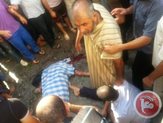
Israeli forces on Monday bombed a park near the beach in Gaza City as well as al-Shifa hospital, killing at least 10 children on the first day of the Eid al-Fitr holiday, medics said.
The strike on the park hit a playground beside the al-Shati refugee camp, while the other strike hit the outpatient clinic of al-Shifa Hospital, which is the main hospital in the besieged coastal enclave.
The strike on the park -- which reports suggested was a drone strike -- hit the playground, killing 10 children as they played with their families while wearing holiday clothes they had been given to celebrate the end of the holy Muslim month of Ramadan.
Eyewitnesses said that 40 were also injured in the strike, which some were calling an "Eid massacre."
The Israeli army, however, said that the deaths were a result of "failed rocket attacks" launched by Palestinian militants.
Government Coordinator in the Territories Yoav Mordechai told Ma'an that the rockets were launched by Palestinian militant group Islamic Jihad.
Director of reception at al-Shifa Hospital Ayman al-Sahbani said that a total of 10 children's bodies had arrived at the hospital as a result of the two strikes. It was unclear how many casualties had come as a result of the attack on the hospital.
The strike on the park hit a playground beside the al-Shati refugee camp, while the other strike hit the outpatient clinic of al-Shifa Hospital, which is the main hospital in the besieged coastal enclave.
The strike on the park -- which reports suggested was a drone strike -- hit the playground, killing 10 children as they played with their families while wearing holiday clothes they had been given to celebrate the end of the holy Muslim month of Ramadan.
Eyewitnesses said that 40 were also injured in the strike, which some were calling an "Eid massacre."
The Israeli army, however, said that the deaths were a result of "failed rocket attacks" launched by Palestinian militants.
Government Coordinator in the Territories Yoav Mordechai told Ma'an that the rockets were launched by Palestinian militant group Islamic Jihad.
Director of reception at al-Shifa Hospital Ayman al-Sahbani said that a total of 10 children's bodies had arrived at the hospital as a result of the two strikes. It was unclear how many casualties had come as a result of the attack on the hospital.
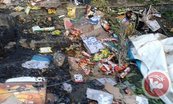
Thousands of Palestinians have taken refuge in the al-Shifa Hospital, as 130,000 have fled their homes as Israeli authorities declared more than 43 percent of the Gaza Strip off-limits to civilians and destroyed more than 2,000 homes in recent weeks.
Israeli shelling killed two Palestinians in Jabaliya earlier on Monday amid a relative lull in fighting compared to previous days.
Another Palestinian, meanwhile, succumbed to his wounds, while seven bodies were recovered in Khuzaa in the eastern Gaza Strip as medical teams took advantage of the calm to retrieve bodies from the rubble of the heavily bombarded neighborhood.
Israeli shelling killed two Palestinians in Jabaliya earlier on Monday amid a relative lull in fighting compared to previous days.
Another Palestinian, meanwhile, succumbed to his wounds, while seven bodies were recovered in Khuzaa in the eastern Gaza Strip as medical teams took advantage of the calm to retrieve bodies from the rubble of the heavily bombarded neighborhood.

The attacks came a day after Palestinian militants announced a 24-hour ceasefire beginning Sunday at 2 p.m. Israel refused to officially accept the ceasefire, but officials said they would restrain attacks to "retaliation" to Palestinian attacks.
Several rockets were fired on Monday into Israel.
Monday's attacks brought the total Palestinian death toll to 1,055, with more than 6,200 injured.
The Israeli army says at least 43 Israeli soldiers have been killed in clashes with Palestinian militants in the same time, while three civilians have died in rocket attacks on Israel.
Several rockets were fired on Monday into Israel.
Monday's attacks brought the total Palestinian death toll to 1,055, with more than 6,200 injured.
The Israeli army says at least 43 Israeli soldiers have been killed in clashes with Palestinian militants in the same time, while three civilians have died in rocket attacks on Israel.
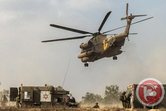
Hamas' al-Qassam Brigades announced Monday that its fighters had killed two Israeli soldiers near Gaza City.
The Brigades said in a statement that militants had targeted an Israeli tank with a missile, killing two soldiers in the village of Juhr al-Dik.
The announcement came on a day of relative calm in the Gaza Strip, the 21st day of fighting.
Hamas' militant wing earlier in the day said it had clashed with Israeli soldiers in Jabaliya in northern Gaza, firing six mortars at troops.
They militants also fired at soldiers with small arms weaponry.
Two Palestinians were killed in the same area as Israeli artillery shelling targeted houses.
An Israeli army spokeswoman was not familiar with the shelling attacks, but the military said in a statement that soldiers around the Strip had been targeted by mortars.
According to official Israeli military figures, 43 soldiers have been killed during the ground invasion of Gaza that started July 17. Three civilians have also been killed by rocket attacks.
Palestinian militant groups have claimed to have killed scores of soldiers since they invaded the Strip, and say Israel has yet to announce the deaths of many of them.
Gaza factions said in a joint statement earlier that militants would continue fighting until the demands of the Palestinian people were met.
"The resistance will continue defending Palestinians against the Israeli war despite the pressures and conspiracies that intend to diminish Palestinian self-determination," Popular Resistance Committees leader Ayman al-Shashniya said in a statement.
Some 1,045 Palestinians have been killed since the beginning of Israel's assault on Gaza, which has also left over 6,200 injured.
The Brigades said in a statement that militants had targeted an Israeli tank with a missile, killing two soldiers in the village of Juhr al-Dik.
The announcement came on a day of relative calm in the Gaza Strip, the 21st day of fighting.
Hamas' militant wing earlier in the day said it had clashed with Israeli soldiers in Jabaliya in northern Gaza, firing six mortars at troops.
They militants also fired at soldiers with small arms weaponry.
Two Palestinians were killed in the same area as Israeli artillery shelling targeted houses.
An Israeli army spokeswoman was not familiar with the shelling attacks, but the military said in a statement that soldiers around the Strip had been targeted by mortars.
According to official Israeli military figures, 43 soldiers have been killed during the ground invasion of Gaza that started July 17. Three civilians have also been killed by rocket attacks.
Palestinian militant groups have claimed to have killed scores of soldiers since they invaded the Strip, and say Israel has yet to announce the deaths of many of them.
Gaza factions said in a joint statement earlier that militants would continue fighting until the demands of the Palestinian people were met.
"The resistance will continue defending Palestinians against the Israeli war despite the pressures and conspiracies that intend to diminish Palestinian self-determination," Popular Resistance Committees leader Ayman al-Shashniya said in a statement.
Some 1,045 Palestinians have been killed since the beginning of Israel's assault on Gaza, which has also left over 6,200 injured.
You find the photo's/video's disturbing? Remember, this is what Palestinian children see almost every day
|
|
|
Truce violations List of names Pictures of martyrs
Days: Aug: 26 - 25 - 24 - 23 - 22 - 21 - 20 - 19 - 18 - 17 - 16 - 15 - 14 - 13 - 12 - 11 - 10 - 9 - 8 - 7 - 6 - 5 - 4 - 3 - 2 - 1
July: 31 - 30 - 29 - 28 - 27 - 26 - 25 - 24 - 23 - 22 - 21 - 20 - 19 - 18 - 17 - 16 - 15 - 14 - 13 - 12 - 11 - 10 - 9 - 8
Days: Aug: 26 - 25 - 24 - 23 - 22 - 21 - 20 - 19 - 18 - 17 - 16 - 15 - 14 - 13 - 12 - 11 - 10 - 9 - 8 - 7 - 6 - 5 - 4 - 3 - 2 - 1
July: 31 - 30 - 29 - 28 - 27 - 26 - 25 - 24 - 23 - 22 - 21 - 20 - 19 - 18 - 17 - 16 - 15 - 14 - 13 - 12 - 11 - 10 - 9 - 8
